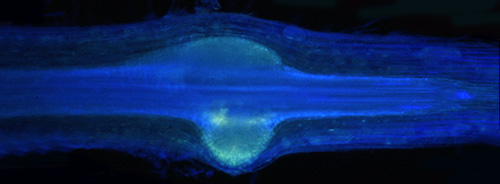Understanding the role of peptide hormones in determining root architecture
The architecture of the root system is integral for plant productivity as the spatial deployment of roots will substantially determine the ability of the plant to exploit nutrient sources.
Research themes
Project status
Content navigation
About

The architecture of the root system is integral for plant productivity as the spatial deployment of roots will substantially determine the ability of the plant to exploit nutrient sources. Plant roots show remarkable developmental plasticity, enabling the formation of de novo organs- lateral roots, which are critical for the development and the dynamics of root architecture and, in legumes, symbiotically-derived nitrogen-fixing root nodules, which are essential for sustainable agriculture. Root plasticity is also dictated by the availability of soil nutrients and the environmental conditions plant live in.
The lab investigates roles for peptide hormones in root development and utilizes a broad range of techniques in cell biology, molecular biology, genetics, developmental biology, proteomics, chemistry, bioinformatics and plant physiology. Numerous project opportunities are available at all levels from summer student projects, special projects for undergraduate students, honours, PhD and post-doctoral research. Projects will normally be related to the laboratories core interests but some flexibility is possible when defining project topics especially if they involves cross-disiplinary projects.
Areas of interest include:
- defining regulatory peptide signaling pathways
- defining the mechanisms through which regulatory peptide enhance root nodule formation
- peptide isolation and chemistry
- defining links between environmental influences and regulatory peptide gene expression
- defining paths for applying knowledge gained from studying model systems into crops of agronomic importance
Projects that span chemistry or bioinformatics or plant physiology and the mechanisms underpinning regulatory peptides are also welcomed. Enquiries can be directed to the lab leader or individual staff members.
Email contact (s): Michael Djordjevic

